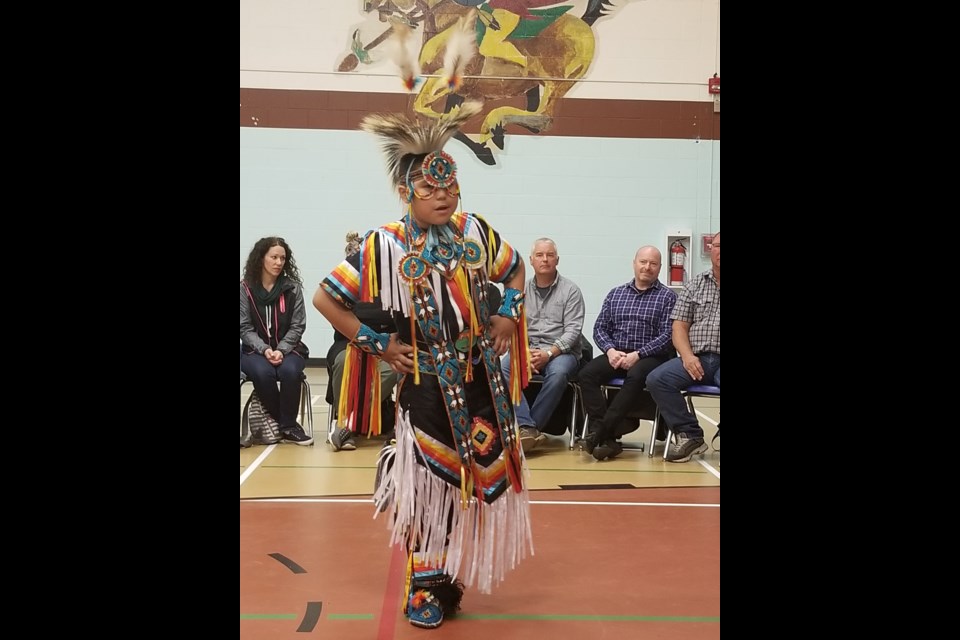The Town of Cochrane and the Rotary Club of Cochrane wrapped up its pilot Indigenous Learning Series project with a full-day event in Morley last week.
Approximately 50 town staffers and Rotarians bused to the First Nation community to take part in a day of cultural and learning activities that served as the culmination of a curriculum that combined experiential and academic learning. Once a month for seven months, the learning series worked to educate participants about the history of First Nations people, the impacts of colonialism and residential schools, and how to work toward reconciliation and building partnerships.
"It was done experientially and it was also done academically. There was a curriculum and written work that was developed by Michael and Judy, who are both PhDs, so it has a heaviness to it, but there is a lot of good information in it. The experience of interacting as a group and listening to the elders from Morley who came to talk to us that's where we got a lot of the message," said Stephen Simms, past president of the Cochrane Rotary Club.
The curriculum was developed by Michael and Judy Bopp Rotarians from Four Worlds, an organization dedicated to improving the lives of those trapped in poverty, experiencing ill-health, social and economic deprivation, or that lack basic human rights.
For the final day, the participants were treated to traditional dancing and drumming, discussions ranging from First Nation governance to perceptions and roots of racism, a tour of the Morley area, and a once-in-a-lifetime opportunity to watch a traditional medicine wheel ceremony on sacred Stoney Nakoda Ground. Elders also presented the attendees with handmade medicine wheels to take home.
"What I've learned is that the trauma that colonization created on the indigenous community is not well-known or well understood and it needs to be far better understood," said Simms
Simms added the learning series was an invaluable tool toward reconciliation, which has been top of mind across the country since the Truth and Reconciliation Commission handed down its final report in 2015 and contained 94 calls to action that aimed to "redress the legacy of residential schools and advance the process of Canadian reconciliation, the Truth and Reconciliation Commission makes the following calls to action."
Among those was call "upon federal, provincial, territorial, and municipal governments to provide education to public servants on the history of Aboriginal peoples."
"In reconciliation you can't reconcile something until it's understood. To me it's called truth and reconciliation for a reason because you need to get the truth before you can get to reconciliation. So, it was a journey of truths, and to kind of understand what we have experienced and what they have experienced and what we have not been told and what we have not be taught as colonizers, so to speak," said Simms.
Simms concluded by saying the most touching and memorable moment over the seven months was standing at the medicine wheel and witnessing a ceremony few non-Indigenous people have had the opportunity to experience.
Moving forward, the town and the Rotary Club will assess the work that was done and determine the next steps. Tentatively, there are plans to open the learning series up to public participation.
"I think just understanding someone's story changes your awareness, changes your empathy level, changes your understanding and I think that it truly can be seen as a bridge and we both have to walk it. It's not a one way bridge, we both have to walk over," said Simms. "Both of us as cultures have to break that down and recognize that we are all just people living on this planet and we need to figure out how to get along. We need to figure out how to live together. That's not just with our indigenous neighbours, that's around the world."
Simms' sentiment was echoed by the elders and community leaders who spoke on the final day.
Elder Tina Fox, who was an active participant over the seven months beginning with helping conduct a blanket ceremony to launch the learning series, said she appreciated the journey and was hopeful of the relationships it will build between the Stoney Nakoda people and the Town of Cochrane.



